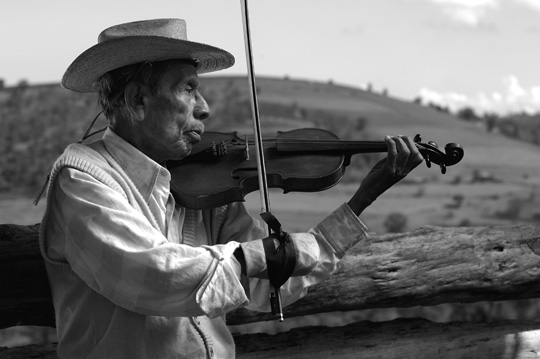|
Reviews of Recent Independent, Foreign, & Documentary Films in Theaters and DVD/Home Video
Written, Produced & Directed by: Francisco Vargas. Photographed by: Martín Boege Paré. Edited by: Francisco Vargas Quevedo & Ricardo Garfias. Music by: Cuauhtémoc Tavira & Armando Rosas. Language: Spanish with English subtitles. Country of Origin: Mexico. 98 min. Not Rated. Released by: Film Movement. With: Don Ángel Tavira, Gerardo Taracena, Mario Garibaldi, Dagoberto Gama & Fermín Martínez. The Violin opens with a brutal interrogation and rape that are distressingly timeless. It could be happening in the Chiapas or to another peasant revolt against a repressive military. The film’s timelessness is emphasized in its black-and-white cinematography, linking it to such urban predecessors as Luis Buñuel’s Los Olvidados and the Italian neorealists. Expanding from his 2004 short film, writer/director Francisco Vargas tells the simple plot visually with minimal dialogue, primarily through the faces and music of the charismatic cast, led by Don Ángel Tavira as the patriarch Don Plutarco. Violinist Tavira, as the descendant of traditional musicians, was the subject of Vargas’s documentary on musical preservation, Tierra caliente… Se mueren los que la mueven. When the three generations of Hidalgos go on the road together as itinerant buskers, singing the corridos ballads commemorating popular revolutionary heroes, their travels provide useful cover for the rebel activities of Don Ángel’s son, Genaro (Gerardo Taracena), who becomes frantic to save his wife and daughter from revengeful soldiers. The film’s first half establishes the horrific brutality of the armed forces, supervised by the Lieutenant (Fermín Martínez). Their actions push the peace-loving, but not passive, farmers into militant and organized rebellion. But the one-dimensionality takes more shape, and the tension builds when the wily old violinist starts a daring and subtle negotiation with the Captain (Dagoberto Gama) in which each tries to use sympathetic revelations to trick the other. While the story tends to wallow in stereotypes, from the corrupt patrón to a comparison of the peasants to Prometheus stealing fire from the gods, Martín Boege Paré’s cinematography is gorgeous and always eye-catching: figures, seen as silhouettes against sunsets and full moons, move slowly through a scenic landscape and endless roads stretching into the horizon. The score (mostly written by Don Ángel’s godson Cuauhtémoc Tavira) smoothly incorporates several traditional Mexican song formats, reflecting Vargas’s earlier career in musical documentaries for radio.
In King Vidor’s classic 1934 tribute to agrarian idealism, Our Daily Bread, the farmers declare the violinist and his instrument to be as
essential to their future as their muscles and shovels. Even with its concluding contemporary cynicism, The Violin beautifully continues in
Vidor’s tradition.
Nora Lee Mandel
|

